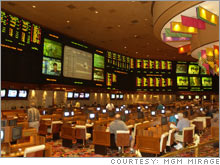Don't bet on pro sports coming to VegasDespite talk of a professional sports team coming to Las Vegas, it's still a long shot.NEW YORK (CNNMoney.com) -- There's a lot of talk lately about either the National Basketball Association or National Hockey League moving a team to Las Vegas. The NBA held its All Star game in Las Vegas, and Mayor Oscar Goodman is working on a proposal to the NBA about a possible arena and changes in the city's sports gambling regulations. (Nevada is the only state with legal betting on sports.) 
And the NHL's Pittsburgh Penguins were recently in town to talk about a possible move while they were in negotiations to get a new arena back home. The Penguins ultimately wound up getting a deal for an arena that will keep the hockey team in Pittsburgh. A lot of people assume that Vegas will be the next city to land a major sports franchise. It saw 85 percent growth in population between 1990 and 2000, and another 14 percent in the first half of this decade to take its population to 545,147. And those population estimates don't count the nearly 40 million visitors who come to the city annually. But despite all you read about interest in Las Vegas as a home for team, it's probably still a long shot. And the reason is only partly related to sports gambling. If teams don't move to Vegas, it's not going to be because of concerns about having their image or integrity sullied by gambling. Instead, its the city's drawbacks -- such the fact that its a relative small television market -- that will keep sports out of Sin City. Only seven U.S. sports teams are based in television markets smaller than Las Vegas and four of those are NFL teams for whom the size of the local TV market really doesn't affect the bottom line due to the league's national TV deal. If you count the Green Bay Packers as being in the Milwaukee market, there are only five TV markets smaller than Las Vegas which have a team, and that includes Oklahoma City, which is an interim home of the New Orleans Hornets. Plus, there are seven television markets larger than Las Vegas without a team so it's not as if it is the only "major" city lacking a sports franchise. Another problem is that many of the city's population, i.e. the potential local fan base, works at night in the hospitality industry. But perhaps most importantly, there's a lot of competition for the entertainment dollar in Las Vegas. So there's no guarantee that a pro team would play to sold-out crowds. "It's very hard to stick you there," said Dave Checketts, an NHL and Major League Soccer team owner who ran the Utah Jazz when the team played about a quarter of its home games in Las Vegas during the 1983-84 season. "We brought in Julius Erving and Larry Bird and everyone said, 'Big deal, go down to the Strip and look at the names we have.'" Checketts said the market has improved as a potential home for a team today, but he thinks that it will be more likely to land an NHL team than an NBA team because there is virtually no wagering on hockey at the state's casinos. Figures from the Nevada Gaming Commission show that 25 percent of the money wagered at sports books in the state is bet on basketball, although that includes college games. Hockey is grouped together with other sports, such as golf and NASCAR, that together account for only 5 percent of bets. And the contribution of sports wagering to a casino's profits is even lower than that. Basketball accounts for only 0.4 percent of the state's gambling winnings, while the catch-all group that includes hockey accounts for only 0.1 percent. When he was in Las Vegas for the All Star game, NBA Commissioner David Stern first said he'd want to see Las Vegas not allow gambling on his league's games before he'd back a franchise move there. He then opened the door a bit by saying that it it might be okay if the city just didn't allow bets on the Las Vegas team's games. NBA Deputy Commissioner Adam Silver told me this week that since the All Star game, the league has heard from several Las Vegas developers who wanted to talk about building an NBA Arena as part of a larger project. He said that no matter what is decided about wagering on basketball, the biggest challenge for moving a team to Las Vegas is determining whether the city can support an NBA team. "It's still a business based largely on season ticket holders," said Silver. "For most teams that accounts for roughly 80 percent of ticket revenue. It creates a different type of challenge in Las Vegas to essentially resell those seats to tourists and conventioneers on a nightly basis. We haven't yet begun an economic study of the market." Jeremy Jacobs, the CEO of the Delaware North Companies, which handles concessions at many stadiums and arenas, and is the owner of the NHL's Boston Bruins, said he believes Las Vegas has both the growth and corporate support that a league is looking for when weighing a franchise relocation. "It's a uniquely different market," he said. "I think you'll see tremendous corporate support. The entertainment people are looking for ways to entertain their customers. I think everyone in sports has got to look at Vegas as having all the characteristics of what we're looking for." But perhaps the best thing Las Vegas now offers any team considering a move there is leverage in their negotiations for a new arena in their current home town. That's basically the way the Penguins played their cards with their trip to Las Vegas. So don't expect Vegas to be dealt into the pro sports game anytime soon. |
| |||||||


